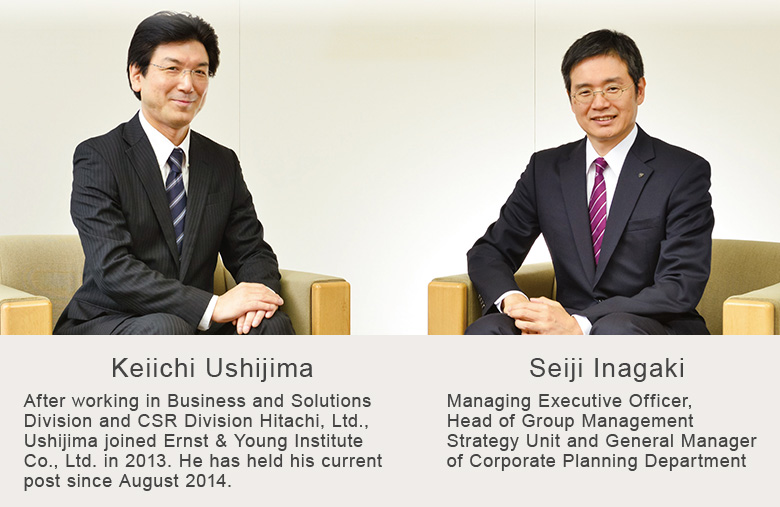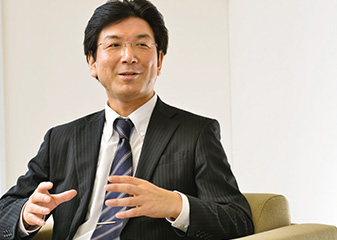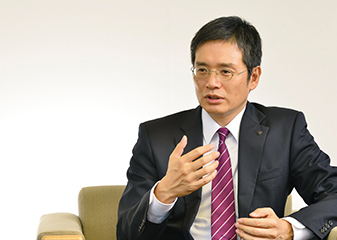In response to the formulation of the Corporate Governance Code as a continuation of the Japanese version of the Stewardship Code, Dai-ichi Life needs to approach governance from the dual perspectives of institutional investor and a publicly listed company. Given this, Dai-ichi Life invited EY Japan Area CCaSS Leader Keiichi Ushijima, who is well acquainted with governance for global companies, to engage in a dialogue with Managing Executive Officer Seiji Inagaki on the future role of Dai-ichi Life.

Outline of the Stakeholder Dialogue
| Theme | Striving to Become a Role Model that Leads Japan in Governance |
|---|---|
| External Stakeholder | Keiichi Ushijima, EY Japan Area CCaSS Leader |
| Participants from the Company | Seiji Inagaki, Managing Executive Officer, Head of Group Management Strategy Unit and General Manager of Corporate Planning Department |
- *
The company name, the affiliation and position of employees and outsiders are at the time.
Fulfilling Responsibility from Dual Perspectives
Ushijima From my perspective, in a sense your company can become something that represents the future role of the financial industry. You have two sides — the stance of an entity that was demutualized and tackles a stewardship code as an institutional investor, and the stance of a publicly listed company grappling with a corporate governance code. To date, Japan's financial institutions have been described as interlocking and closed. Amid questions as to how their relationship with companies will change in response to both codes, the initiatives undertaken by Dai-ichi Life are attracting attention.
Inagaki Speaking first from our stance as an institutional investor, last year we formulated a Stewardship Activities Policy to ensure that we fulfill our role as a responsible institutional investor. Now with both codes having taken effect, at this stage we have started to feel a positive response in our ability to engage in constructive discussions through the dialogues we have with companies we invest in that are serious about their management.
Ushijima As for what impact you will have on the world through investment, while ensuring more immediate profits and cost reductions, investment activities from a more sustainable and long-term perspective need to be implemented.
Inagaki That is precisely what we hope to accomplish. We are also working on an ESG fund. By having analysts who have previously focused on financial analysis and currently analyze companies based on non-financial aspects as well, our investment valuations are undergoing gradual change. We believe that this pretty much represents social responsibility as an investor.

Ushijima As a joint stock corporation, your own governance is also important. As an investor, Dai-ichi Life's stance is to demand adequate governance on the part of the companies in which it invests. Your company is in a special position that makes it susceptible to being described as duplicitous by being hard on others and easy on itself. Society expects you to develop into a company that serves as a future role model.
Inagaki Dai-ichi Life takes pride in the fact that it has regarded governance with a great degree of seriousness since its founding. Dai-ichi Life establishing the first mutual corporation in Japan and being the first major life insurance company to be demutualized are both results of our consideration of the responsibilities we need to fulfill to our stakeholders on the scale of forty to fifty years, based on our "Customer First" philosophy.
Ushijima How was the response when you engaged in dialogue with shareholders as a publicly listed company?
Inagaki When we first became publicly listed, we found it difficult to earn investor understanding regarding plans for overseas business expansion, but by the fifth year the results of the endeavor could be seen and there was a sense that we had finally won their understanding.
Ushijima Particularly when it comes to long-term overseas investors, questions such as how the longterm strategy is connected to the long-term benefits of shareholders and other stakeholders and how the story of long-term value creation will unfold become points of interest. On the other hand, I often hear that many Japanese companies provide inadequate explanations with regard to these points.
Inagaki Similarly, rather than simply presenting financial targets, we want to properly convey the essence of the company in terms of where we are headed and what we hope to accomplish. When we engage in dialogue with investors who are willing to listen to what we have to say in this regard, we can also expand our own field of view, and when they agree with our vision, we take this as a push of support.
The Key to Global Management is Diversity
Ushijima I believe that the foundation of global governance in its truest sense is diversity. In the pursuit of global management, there are limitations to only relying on the sensibilities and perspectives of people raised in Japan. On the premise of sharing a company's philosophy and values, I think that diverse human capital is an absolute requirement. I believe that it is only when we bring in perspectives that we don't have ourselves and look at management from many sides that global decision-making becomes possible.

Inagaki We have an awareness of issues with regard to that point. Last year we established a regional headquarters in Singapore. English is the common language spoken there, and in the future we have plans to make more than half the employees non-Japanese. We expect that human capital who possess both a global and local perspective will do well at the regional headquarters. In October 2016 we intend to shift to a holding company structure, and we feel that human capital with such perspectives will have to take the lead in terms of holding company management.
As a part of our efforts to foster the development of such people, the Dai-ichi Life Group holds a Global Management Conference (GMC) where practical-level staff from the Group companies gather to conduct face-to-face meetings on individual themes. By doing so, we think the staff will develop mutual awareness of issues, be inspired by initiatives at other group companies and learn from each other.
Ushijima While building organizational mechanisms is one aspect of global management, the aspects that rely on people, such as how well informal networks function, are also an important factor. Developing trusted interpersonal relationships on a global scale is essential. If the people who learn from one another and cultivate their sensitivities assume important posts in the end, it will become easier to engage in decision-making from a global perspective through the utilization of networks.
Disseminating Health-conscious Management from Japan as a Leader in Tackling Issues
Ushijima Japan has long grappled with the issue of limited natural resources along with problems such as an aging population and natural disasters. Accordingly, Japan leads the world as a nation confronted with various issues and social limitations. It is for this reason that the solutions Japan has developed as a result of tackling these issues headon will translate into a competitive advantage for Japan moving forward. As for how companies will be involved, I think insurance is a field that will assume such a role.
Inagaki Many of our customers belong to the baby boomer generation. As for how we respond when those people reach an age that requires personal care and nursing care, since Dai-ichi Life has more than 40,000 Total Life Plan Designers who make sure to visit policyholders on a regular basis, we are able to provide customers with timely health information and quickly carry out procedures for the disbursement of benefits. I think it would be wonderful if we could leverage the strengths of our business model to contribute to society. Having customers extending their healthy life expectancy is preferable both for customers and for Japan as a whole, and as a result, this improves the soundness of overall insurance policies accepted by insurance companies.
To ensure we are able to deliver support that will please our customers, we have concluded partnership agreements with various specialist medical organizations and built a structure that enables us to provide the latest information concerning the three major illnesses, geriatrics and gerontology.
We also coordinate with local governments and have made progress in providing health information and raising awareness among people in local communities.
Ushijima These initiatives will make excellent use of Dai-ichi Life's unique capabilities. Today's discussions have been very interesting. I have also learned something about an attitude which truly seeks to respond to the expectations of customers with sincerity. I think Dai-ichi Life is a business expected to develop into a company that will serve as a future role model.
Inagaki Today's discussions have been full of useful suggestions and have given me the opportunity to reaffirm that many challenges still remain. Thank you for your time.